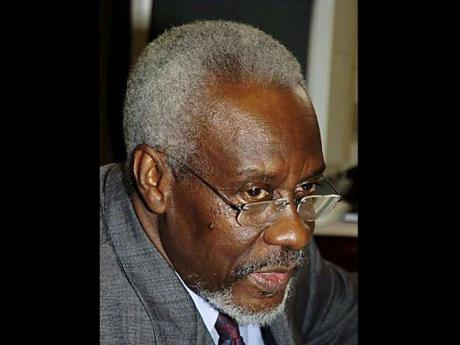Disrespect in Gordon House
A.J. Nicholson, Contributor
THERE IS a lot for Jamaicans to contemplate these days: the economy and the ever-rising cost of living; the spin-doctor's story; the indiscipline which envelopes our social interaction; the disdain we display regarding the principles of the hallowed conventions that make for the ordered society; and the severe physical challenges to everyday living, concretised by Tropical Storm Nicole - check the citizens of Chigwell, in Hanover.
The Honourable Danville Walker did well to withdraw the stridently made charges concerning "all 60 of them in Gordon House". That was an appropriate gesture. For, while it is not wise to "eat your rice when it's hot", it is necessary that you immediately apologise to your lips and your tongue when you err in that regard. Appropriately, too, The Sunday Gleaner has done so, prominently, with respect to the reference to Minister Andrew Holness in last week's publication. It augurs well for adherence to the responsibilities that attach to the constitutional right to freedom of expression.
Too late to apologise
And, philosopher 'Farmer Joe' would advise the director of customs that he should also have apologised to the nation, when the judges of our Court of Appeal found that his ill-advised and unwarranted intervention was the turning point in the challenge to the eligibility of some candidates to contest the last general elections. In the absence of that intervention by an over-exuberant director of elections, the so-called dual-citizenship cases would more than likely have been decided differently, and there would now be far more certainty as to how such matters are to be resolved. It is not too late for that long-overdue apology.
Sincere apology is part of the body of hallowed conventions that make for the creation of the ordered society. It eases tensions, helping to absorb the hurt that might have been occasioned; it assists in releasing the errant individual from his self-created prison; it provides for frank admission of wrong-doing, paving the way for reconciliation; in short, it helps people to move on, propelled by mutual respect. It constitutes one of the principles of restorative justice - a mechanism utilised in the softer side of the proper administration of justice, and which must be encouraged, if Jamaica is to become a well-ordered society.
Of course, an apology does not have to be tendered by words. Indeed, the view is strongly held by the practitioners of restorative justice that actions speak far louder than words along that road. They say that the adage 'by their deeds you shall know them' will provide the best evidence as to whether lessons have been learnt by the perpetrator, and whether disappointment has come to a victim, on account of misplaced trust and confidence.
Pledge broken
One of the real challenges that the advocates of restorative justice constantly face, is the fear that 'what gone bad a mawnin' caan come good a evening'. Recently, when I made a contribution to this newspaper concerning the children of the 'Dudusgate' hundreds-pound gorilla that resides in Jamaica House, I privately pledged that I would not return to the subject publicly. Not because of any urging on the part of some, that we should "forget and move on", but, since the prime minister and his Government had stubbornly determined that they would stonewall on the issues, I decided that I would just watch the deeds of the prime minister going forward.
Those deeds, culminating in his recent approach to the establish-ment of the commission of enquiry, have caused me to break my silent pledge; for, the astounding behaviour of our head of government, at the point of what should have been the beginning of the event could cause the sun to set on these months of collective pain and anguish, 'beats all cock fight'. For, if truth be told, I had envisaged that a properly constituted, independent commission of enquiry could have served as a valve through which a sense of ease could come to all of us as Jamaicans, buffeted as we all have been, by this unclean enervating affair.
The purist, Mr Danville Walker, should know that I regard those disturbing actions of the prime minister as a personal affront, since, as a member of "the sixty", I should be able to take my colleague at his word. I must be able to repose full trust in the assurances given by a colleague in Gordon House. If my colleague does not show respect for me, by keeping his word, that represents action which isgeared towards the unravelling of everything that propels the wheels of morally sound behaviour in the chamber.
Disrespectful behaviour
I regard that disrespectful behaviour as a personal affront for another reason that we would do well to contemplate here in Jamaica, assuming that we hold dear to the view that Jamaica can become a well-ordered society. I assert that Mr Golding would never dream of displaying the sort of behaviour towards President Bill Clinton, who was recently on our shores, as he displayed towards Jamaica's Leader of the Opposition, Portia Simpson Miller. And, I make use of the example of President Clinton, precisely because I do not wish to ruffle any sensibilities in Jamaica. For, I make bold to declare, also, that there are individuals in our country who the prime minister would never dare to treat in that manner.
The disrespect shown to the leader of the Opposition is surpassed only by that shown to the good sense and intelligence of the Jamaican people. The puerile and insincere attempt of our head of government at giving an utterly unbelievable reason to the people that he leads as to why no consultations were held with her, even with them coming face-to-face on the morning of Heroes Day at King's House, is the stuff that fairy tales are made of.
As has been painfully articulated, there were four compelling reasons why it had become an inescapable obligation for Mr Golding to ensure that those consultations take place, so that there would be a solid beginning to repairing the breach, as the restorative justice experts advocate. First, there was the agreement that was struck in November, 2004, between two former heads of government, P.J. Patterson and Edward Seaga, that matters of this nature should attract consensus-seeking. That was pointed out to him. Those understandings sought to capture the spirit which guided the recommendations for constitutional reform, and accepted by Parliament, relating to the selection of members to the commissions referred to in the Constitution itself, such as the Public Service Commission.
Second, there were the assurances given in Gordon House by the prime minister, no less, that there would be such consultations, though the buck stopped with him, presumably according to the provisions of the enabling legislation.
Third, the widespread history-making interest and anxiety shown by persons drawn from so many sectors of the society, took the process for the establishment of this commission out of the norm, and because of the power that its findings could come to have in easing the burden that we have all been forced to bear.
And the fourth reason provided the acid test - the lawyers would say the experimentum crusis - of the prime minister's judgment and perception, for it was, in essence, his conduct and his actions that would form the subject matter of the enquiry. How, then, could he be prepared to be the judge, the sole judge, to determine the membership of a forum to inquire into a cause that was fund-amentally about how he had handled the matters that would be in issue?
PM failed test
Mr Golding's response to these four unprecedented imperatives which existed side by side would set the framework for the determination of "by their deeds you shall know them", one of the main strings to the bow of restorative justice practitioners. That is their test of whether an apology was truly sincere. Sadly, Mr Golding has failed that test miserably; and as it was in the beginning, so it is in the end.
The prime minister started his parliamentary journey through the minefield called 'Dudusgate' with the stentorian declaration in Gordon House that if the minister of justice signed the authority to proceed, she would have to be prepared to present her letter of resignation at the same time. That kind of disrespect to the constitutional office of the attorney general, provided for in our Constitution, did not seem to bother the incumbent.
The head of government paused on his tortuous journey to feign an apology to the people of Jamaica for having taken them on a merry ride, when all other members of the government that he leads, declared that they saw nothing wrong in his conduct and actions. That situation did not seem to bother either him or his colleagues.
With all that, Mr Golding was presented with a final opportunity to end that journey of torture with a display of even a modicum of respect and style. Instead, he proceeded to swell his trust deficit, by reneging on assurances which he had given in Gordon House a mere one week before. That would be bothersome to the citizens of Chigwell, for, what confidence can they have that the prime minister and his government will not be as disrespectful to any word of assurance given to them in their challenging hour of need?
A.J. Nicholson is opposition spokesman on justice. Feedback may be sent to columns@gleanerjm.com.


